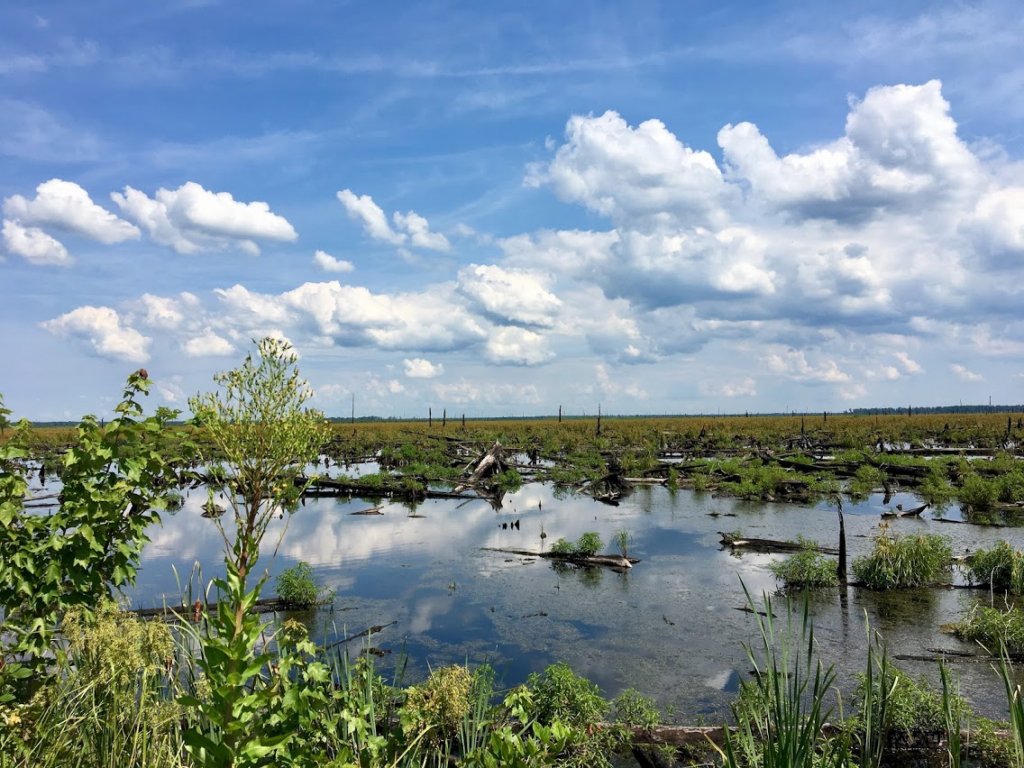
Statewide Flood Preparedness Outreach
The Virginia Community Flood Preparedness Fund
The Virginia Community Flood Preparedness Fund (CFPF) is a statewide grant and loan program administered by Virginia’s Department of Conservation and Recreation (DCR), offering community-scale funding to VA localities and planning district/regional commissions for plans, studies, and projects that mitigate tidal and rainfall flooding.
Wetlands Watch provides technical assistance to any eligible applicant seeking funding from the CFPF. Check out our grant resources page, and/or reach out to Gabi Kinney for further information.
Dispersements
DCR has distributed $150M in awards for rounds 1-4. Geographic disbursements for rounds 1-3:
Wetlands Watch is working to improve outreach and engagement with this funding program because resilience efforts in the Commonwealth have largely focused on coastal regions because these local governments often have greater capacity, exposure, and resources to apply for and implement resilience-based projects. The Virginia Coastal Zone Management (CZM) Program, housed in the Virginia Department of Environmental Quality (DEQ), is one such program, providing direct annual funding support to coastal planning district and regional commissions. Virginia CZM has received more than $177 million in federal and state funding since its inception in 1986, establishing a robust foundation for coastal resilience planning in the 29 Coastal Zone localities. Additionally, Virginia benefits from the Virginia Coastal Resilience Master Plan, a robust written and web-based resource managed by the VA Department of Conservation and Recreation. Phase II of this Master Plan is currently underway and intends to expand beyond a coastal scope by incorporating rainfall trends and non-coastal adaptation planning.
The coastal area has also reaped the benefits of NGOs working on the coast, popular media attention to sea level rise, and research support provided by statewide universities. The Virginia Institute of Marine Science (VIMS) is an academic leader in this space and one of the largest marine research centers in the United States. In 2013, VIMS published a recurrent flooding report and in the decade since, its findings have driven partnerships among many universities, NGOs, and the private sector to inform local approaches to resilience investments in the coastal zone.
Inland Expansion
While immense efforts to address coastal flooding issues are underway, Virginia’s western and southwestern communities have experienced significantly more flood severe events that caused major damage, yet these regions receive substantially fewer resources to address flood risk. The state-administered CFPF offers an accessible resource for pre-disaster flood mitigation, however capacity issues and limited outreach to non-coastal communities have compromised the intended equitable distribution of the CFPF’s critical resources.
Because of the unpredictable and highly localized nature of intense rainfall and riverine flooding that impacts inland VA communities, and because many rural localities are built in or near floodplains for convenient proximity to valuable riverine resources, it is imperative that these areas receive funding to incorporate flood mitigation strategies in anticipation of the next major flood event.
To this end, Wetlands Watch is conducting statewide outreach to help promote the CFPF in non-coastal regions and offer direct local goverment technical assistance with grant writing, project and study identification, and overall alignment with CFPF resilience priorities.
Deep Dive: The Community Flood Preparedness Fund
The Virginia Community Flood Preparedness Fund (CFPF) is a statewide grant and loan program administered by Virginia’s Department of Conservation and Recreation (DCR), offering community-scale funding to VA localities and planning district/regional commissions for plans, studies, and projects that mitigate tidal and rainfall flooding. The CFPF:
Prioritizes community-scale, nature-based designs and planning, and supports DCR’s ongoing work to address statewide flood protection and resilience principles shared by its new state-wide flood protection master plan and the Coastal Resilience Master Plan.
Is required by law to distribute 25% of awarded funds to low-income geographic areas. Applicants can use a census web-viewer to determine if the project area income is less than 80% of the local median household income. This requirement assures more equitable distribution of state resources and helps communities that have been historically left behind begin, or advance, resilience work.
Is guided by DCR’s state planning principle to acknowledge the consequences of climate change and base decision making on the best available science.
Funds three categories of award related to flood resilience and mitigation:
a. Planning and Capacity Building
b. Studies
c. Projects
Intends for localities to work their way through each category, starting with resilience planning and studies, to build upon their progress and familiarity with flood resilience planning and to ensure a strategic approach to project implementation.
Allows localities to access Study funding to scope out and inform resilience planning (studies can include, but are not limited to, hydrologic/hydraulic analyses, floodplain map and ordinance updates, and floodplain data collection).
Requires that localities must first have a DCR approved local resilience plan before applying to the Project category, funding for which is provided by the Planning and Capacity Building category.
As flooding becomes a more prevalent topic in statewide planning, the staged structure of the CFPF is a great resource to help guide localities into resilience work and provide uninterrupted, successional funding towards safeguarding communities from flooding.
To reap the full benefits of the CFPF, localities must think intently about the flood issues their community faces and, through thoughtful community engagement and studies, create a well-informed framework that guides the implementation of and justifies reasoning for Project funding later on.
Visit Grant Materials page below for more information.

